Hiking Alone
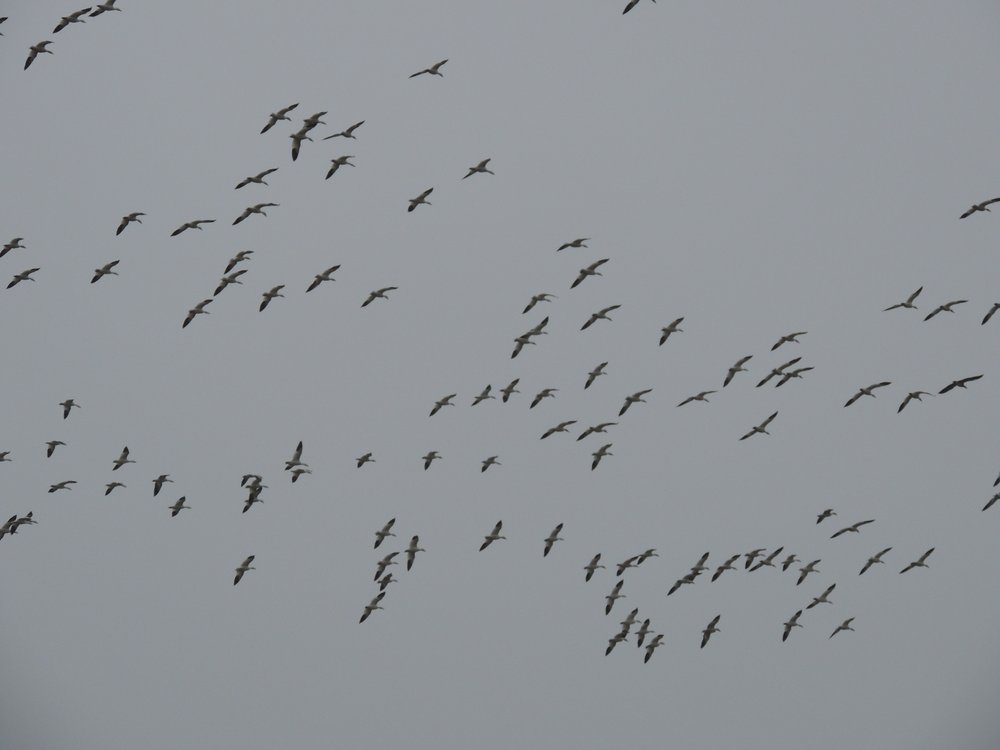
I had wandered my way eastward to this trailhead, stopping at one of my favorite farms to admire flocks of Snow Geese coming in for whatever leftover corn they can find on their route south. Since I didn't know when or if I was going to hike this trail, I haven't let anyone know I'm out here. I know this is not smart--you should always let someone know your hiking plan. But I'm feeling cut loose in many ways, so I'm out here, wanting my inner and outer worlds to align.
It's a strange feeling, this sense of being unaccounted for. It’s not that there is no one to care; it’s that no one is allowed to care. I want to feel alone. This could lead to a sense of loneliness or alternatively, to a slight euphoria, the elation of freedom. It's the later feeling that took hold as I started up the steep trail.

I had wandered my way eastward to this trailhead, stopping at one of my favorite farms to admire flocks of Snow Geese coming in for whatever leftover corn they can find on their route south. Since I didn't know when or if I was going to hike this trail, I had not let anyone know my plan. I know this is not smart--you should always let someone know your hiking plan. But I'm feeling cut loose in many ways, so I was out there, wanting to walk into that sense of alone.
It's a strange feeling, this sense of being unaccounted for. It’s not that there is no one to care; it’s that no one is allowed to care. This could lead to a sense of loneliness or alternatively, to a slight euphoria, the elation of freedom. It's the later feeling that took hold as I started up the steep trail.
I don't mind that the trail is steep, but I do mind that it's covered in leaves; it was hard to tell what might give and what would take my weight. I slipped a lot, reaching for tree limbs to stabilize me. As I climbed, I felt my heart thumping in my chest. I liked how solid it felt, pushing against my ribs.
Three men and two dogs appeared on the trail above me. They were sliding down the trail, hanging onto trees and rocks, sitting down to maneuver over the larger boulders. I pet the collie dog’s long, fine nose and asked her if she wanted to join me. The men laughed as we continued in our opposite directions. As I turn and briefly watch them slide down to the parking area, I thought: Now I am out here alone.
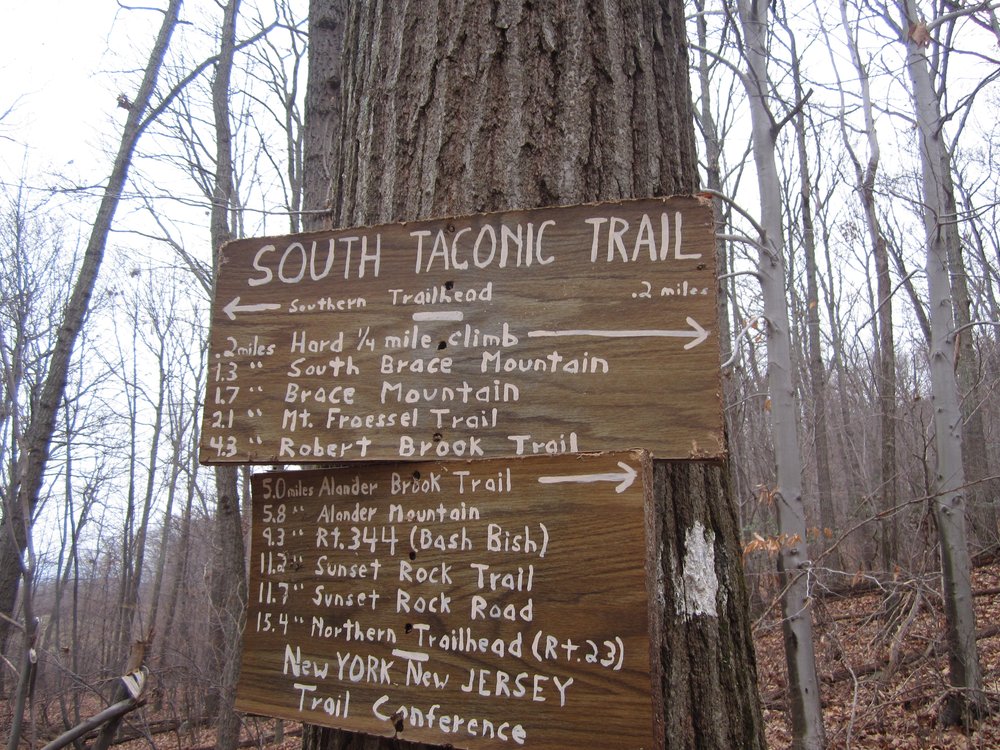
While we climbed in the canyon, we had some friends who--when they were not stoned--knew where we were. It was small but real comfort. But once we were in the park, we were on our own, in this day long before cell phones. Once a week I wrote to my parents to tell them where I was and what I was doing. I lied a lot in those letters. They thought I was sharing an apartment with friends; I was sleeping in a parking lot. I told them I was eating well; we had rice with powdered soup mix most nights. I wondered how long it would take before my parents reacted to the fact they hadn't gotten a letter. And then what would they do? Start searching the state of Colorado? What I realized is that we could disappear and it would be weeks before anyone would sound the alarm, come looking for us. It was a strange thought to have at age eighteen but it was a strong and unnerving one. Perhaps it arose because Munch and I were so lost that summer—in our lives and on the rocks--and had a lot of what we jokingly called epics. But it was also because I had a deep sense no one was paying attention. My father was immersed in writing a novel, my mother absorbed in her translation work. Then, I did want someone to care.
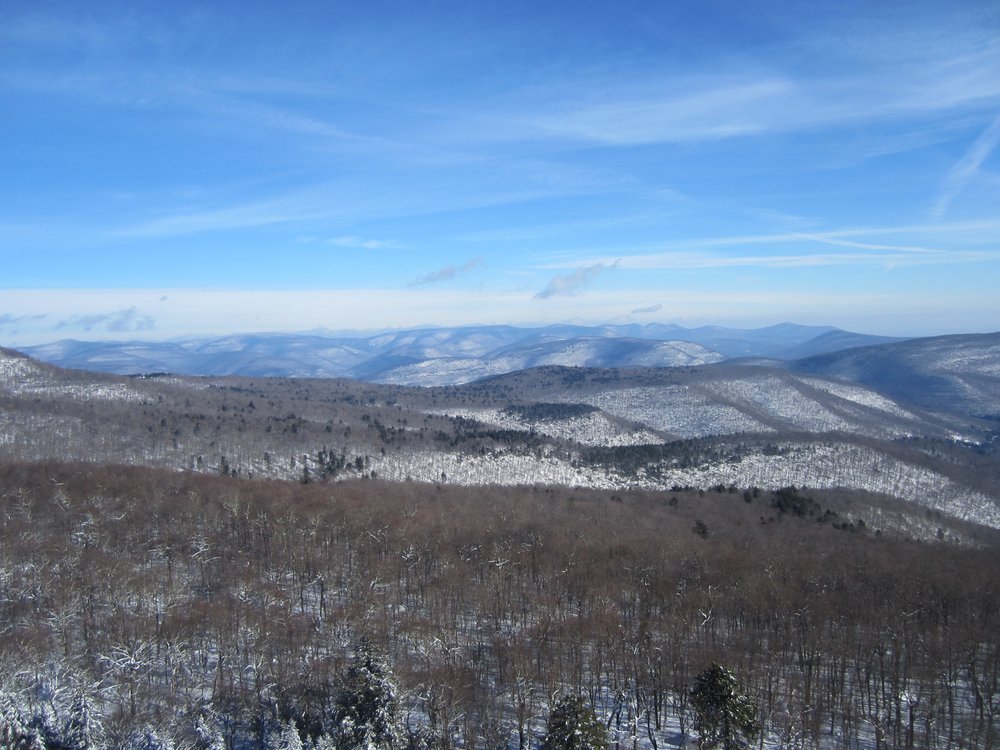
A wind picked up. It gusted over the top of the mountain chilling the sweat on my back. I stopped, drank some water, pulled on a hat. My binoculars dangled at my stomach, but I hardly had use for them. I pished at a squeak from the bushes and a Black Capped Chickadee obligingly appeared to keep me company. They win for most inquisitive, cheerful bird. Down in the valley I could see a long marshy area, which led to a pond, dotted with hundreds of something—ducks, geese—that were too far off to identify.
At the summit of South Brace rests an enormous rock cairn. On clear views there would be views into Connecticut, Massachusetts, New York. Instead, the wind kicked up, gusts that smelled like a storm, like bad weather. I kept on down the trail heading for the summit of Brace and after a hundred yards stopped. I pulled out the map and calculated how far I had to walk to the summit. It seemed ridiculous not to get there, but I didn’t want to get caught out in a storm, adding rain or snow to my slippery descent. I turned around and headed back down the trail.
In Rocky Mountain National Park, Munch and I headed for an area known as Lumpy Ridge. We didn’t have a guidebook, but rather a piece of paper with a few notes on it. “The Book,” “Pear Buttress,” “Sundance.” These were the names of the hunks of granite that soared several hundred feet into the thin air. “Do you think this is the Book?” we would ask each other. But on one day we did a climb named “J-crack,” an unmistakable crack, shaped like a J in the middle of a vast granite wall. No one knew where we were, but for one long day, we knew where we were. And that was a relief.
I was just nearing the descent of the steep section when my ankle buckled under me. I stumbled. The pain shot through my ankle. I sat on a boulder and rested. I drank some water, ate the peanuts I had brought with me. I wiggled my ankle to see if the pain remained.
When I was twelve, I sprained an ankle on the summit of Mount Nittany, which shadows my hometown of State College. College students partying at the summit came to my rescue. They fashioned a stretcher out of tree limbs and denim jackets—this was the early 70s when everyone wore a denim jacket. Four young men hoisted the improvised stretcher and carried me the mile and a half to the car. I felt foolish and they felt heroic.
I knew that no one was going to come along and carry me down this mountain. And I knew I didn’t need that. This was a simple twist, the pain perhaps more imagined than real. But as I sat there I went through what I would do if I had to spend the night in the mountains, how I would set up a bivouac, how I would ration my water. It was when I started to imagine how cold it would get—I could hear the water of the iced-over waterfall—that I stood up and weighted my foot.
My first steps made me wince, but as I continued on, my ankle warmed and the pain dulled. I moved slowly, slithering over rocks, grabbing tree roots to help me down. And this story ends like hundreds before it, with me arriving too soon back at my car, and driving home warm and safe, the pull of exercised muscles overriding the emotions of the day, leaving me happy.
Foraged Thanksgiving
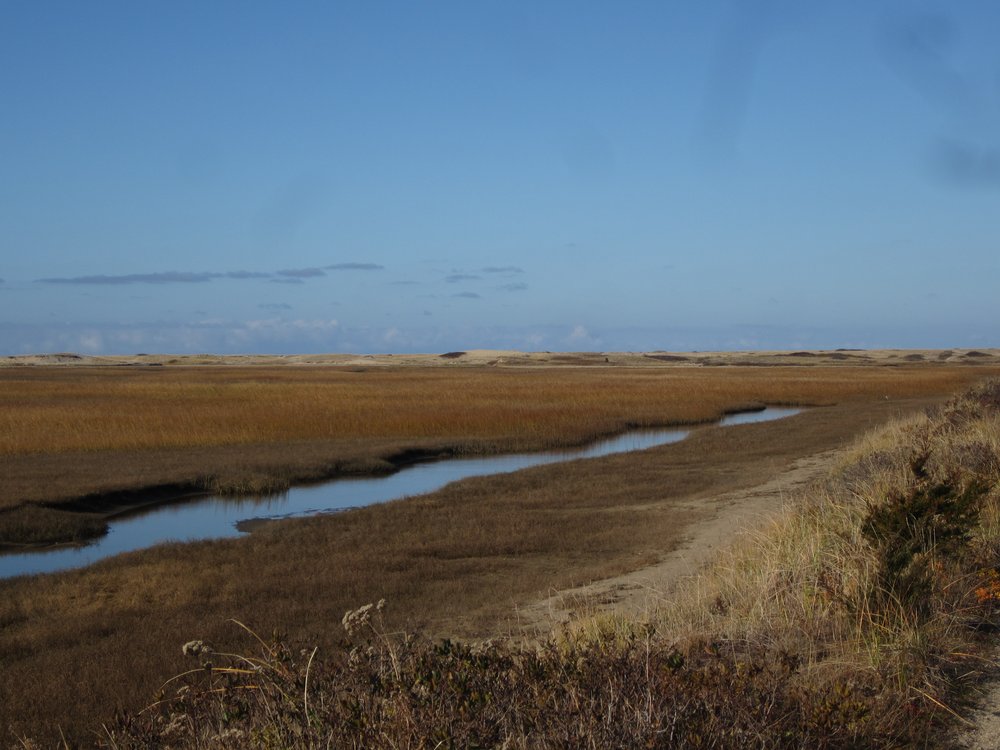
"Thanksgiving dinner?" I asked.
They smiled.
I could feel the elation of the hunt, the story of how they got this bird early on Thanksgiving day. I wanted to ask who was going to pluck the bird, clean it and cook it. There were a lot of soft brown feathers to deal with. For a moment I was jealous of the bird. Pheasant tastes delicious. But I knew I wouldn't be capable of killing the bird. And this day was devoted to eating only food we had gathered ourselves.

"Thanksgiving dinner?" I asked.
They smiled.
I could feel the elation of the hunt, the story of how they got this bird early on Thanksgiving day. I wanted to ask who was going to pluck the bird, clean it and cook it. There were a lot of soft brown feathers to deal with. For a moment I was jealous. Pheasant tastes delicious. But I knew I wouldn't be capable of killing the bird. And this day was devoted to eating only food we had gathered ourselves.
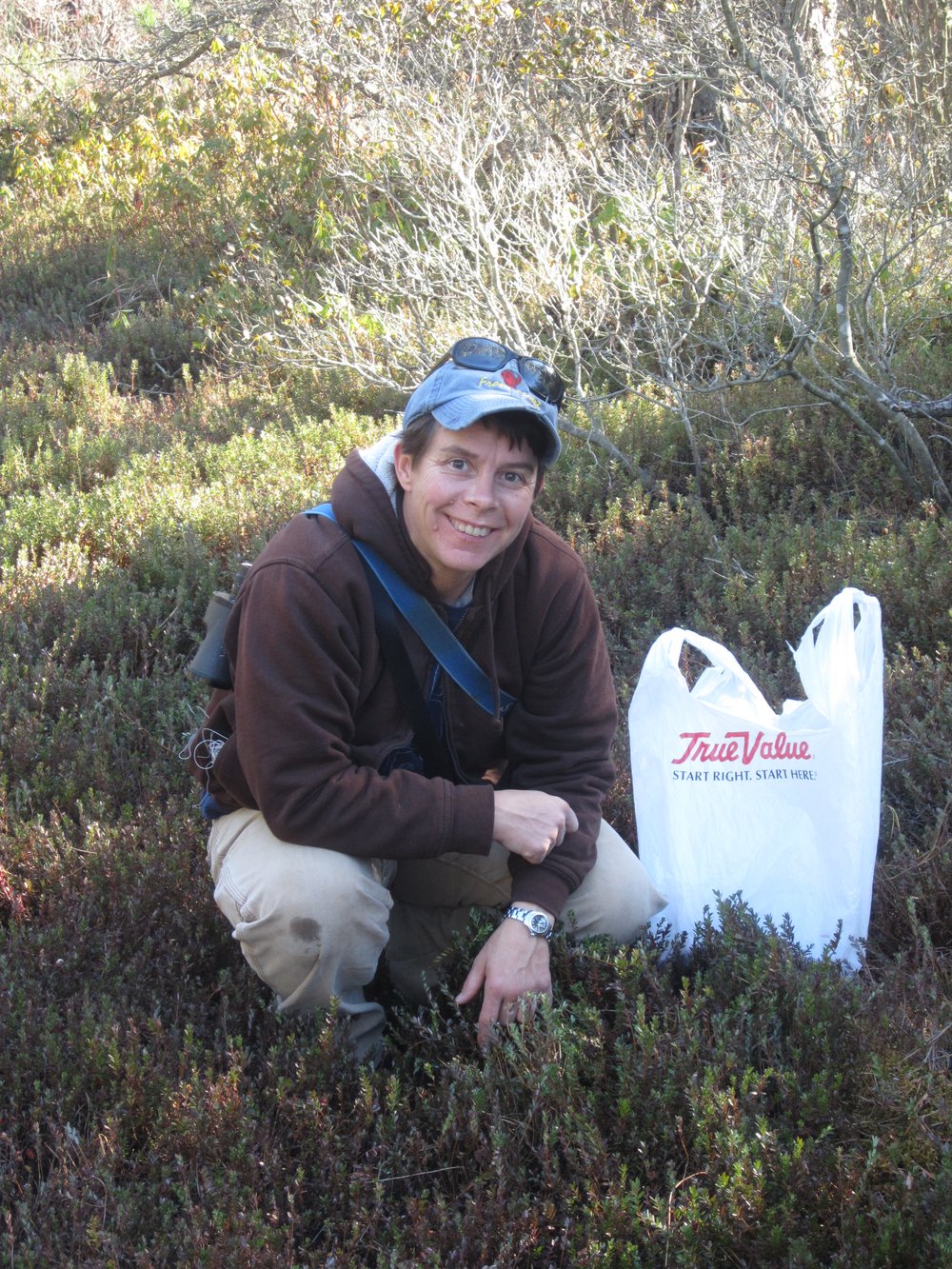
Jody knows these lands well, having lived in Provincetown for almost thirty years. She can lead me to the cranberry bogs, but also to where I might see some Horned Larks and Snow Buntings in the open grassy areas. At one beach there were seals floating nearby, heads bobbing in the cold ocean. We hoped to see whales but did not. Throughout the vast dunes, Jody pointed out fox prints, raccoon, coyote.
This year, the cranberries were sparse. In the past, we had plunked down in a bog and filled our plastic shopping bags. But the first bog we tried was bare. The second patch, nestled around small pitch pines, had a few berries. We worked for them, squatting to see the few bright red berries, taking one or two, then moving on. After an hour we had perhaps two cups. Enough for our meal.

Pulling mussels was easy. We wandered, took a few, then wandered more at low tide. In the distance stood a huddle Black-Backed Gulls and a few fleeting Sandpipers. On the Bay side of the jetty, Common Eider floated near to the rocks, diving for fish. They have beautiful yellow bills and in the clear water we could see them paddling strong to gather their food.
People out for a walk before or after their turkey dinners asked us what we were doing. We boasted about our day of food gathering and a young woman from Manhattan looked incredulous. "Mussels grow here? and you just take and eat them?"
I am no prophet of right eating. I eat organic when I can, eat meat when I want to, but live by no rules. And yet I know we are divorced from what we eat. For one day, I want to know where my food comes from. And I want to know that I could provide that meal. But it's all a game--I wouldn't last long like this and the truth is, cranberries and mussels are not a great pairing.
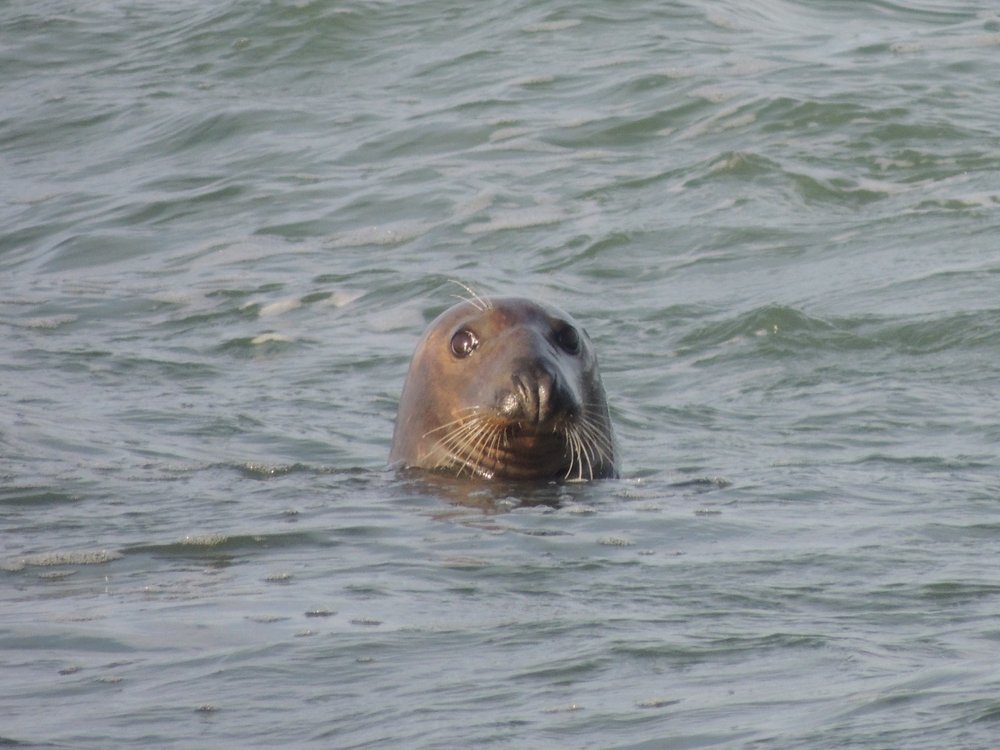
Since those college days we have seen each other at least once a year. I make an annual pilgrimage to the Cape, where my parents spent their honeymoon and where their ashes are scattered in the dunes. I have known all of Jody's jobs, friends, loves—and her pets. On this trip there are two new orange cats George and Fred, and Griffin, the wonder dog who as a puppy joined us on a forage day. We both ponder aloud our single lives. There is no regret; we are both enjoying our freedom, and the fact we are meandering freely together through this beautiful day.
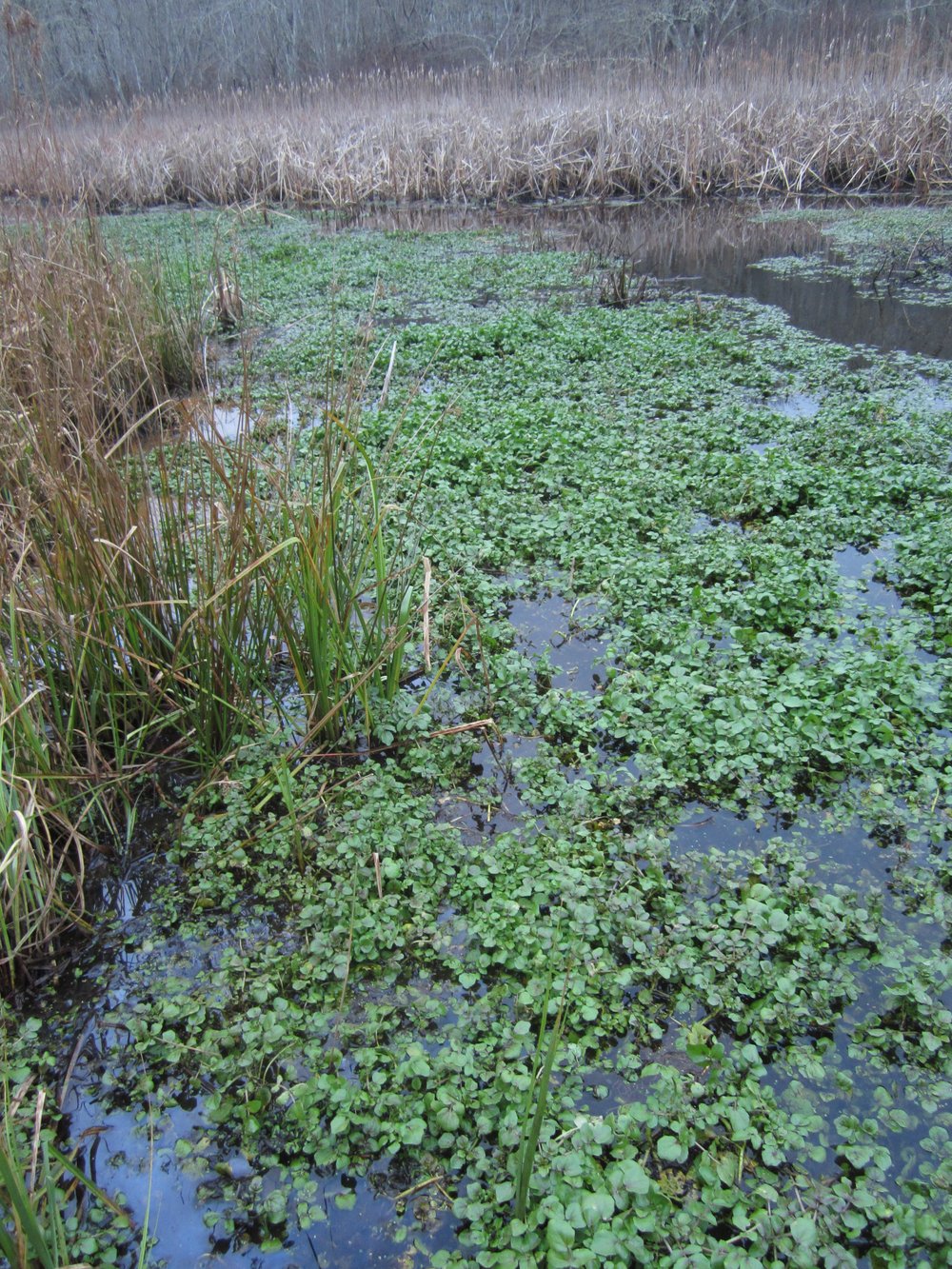
River Time
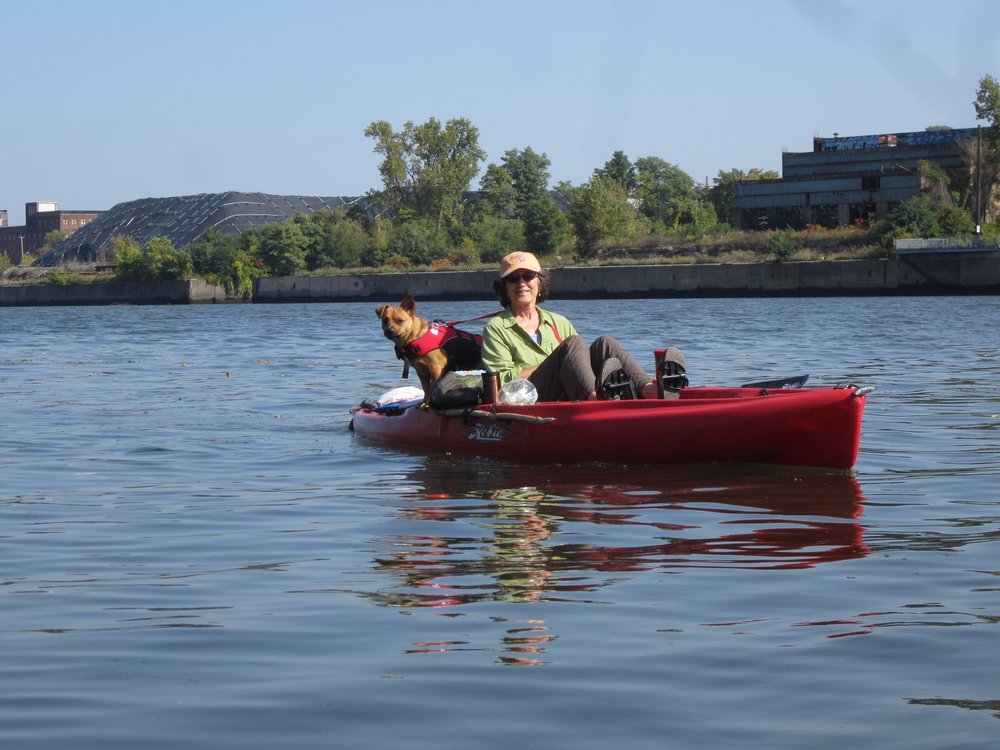
We included Merle, who at age 72 teaches Outward Bound courses, has a shock of curly gray-white hair and a calm steady demeanor; Kate on her pedal boat, after shoulder surgery, long legs shoving south; and me, on a short fall break from teaching, desperate not to think about faculty meetings. The most important team member, however, was Neena, a pint sized dog, which Kate had just rescued. This was Neena’s river baptism. To keep her happy--and who doesn't want to keep a dog happy--we stopped every hour to stretch and pee and marvel over how slowly we were moving.

We included Merle, who at age 72 teaches Outward Bound courses, has a shock of curly gray-white hair and a calm steady demeanor; Kate on her pedal boat, after shoulder surgery, long legs shoving south; and me, on a short fall break from teaching, desperate not to think about faculty meetings. The most important team member, however, was Neena, a pint sized dog, which Kate had just rescued. This was Neena’s river baptism. To keep her happy--and who doesn't want to keep a dog happy--we stopped every hour to stretch and pee and marvel over how slowly we were moving.
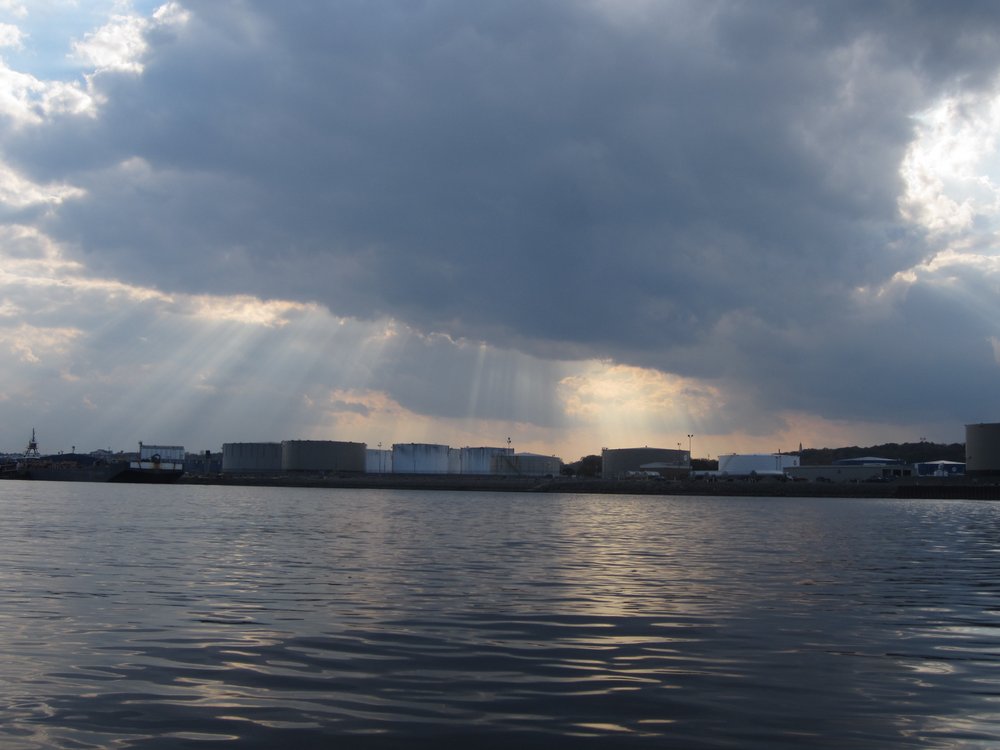
We needed a campsite in this unlovely place. Room for three tents, three boats, three tired women. Papscanee Island is not quite an island, and is rimmed with wooden pylons, visible at low tide, and beyond the pylons, rocks covered over with...asphalt. The asphalt was often cracked in a yawn to reveal a jumble of rock teeth. The Hudson River Watertrail guide states "There is no river access for boaters." But, we needed access into the trees. And that is what we found, directly across the narrow river from a set of oil tanks.
Once dark settled in, once we had eaten our magnificent burritos--all river food is delicious--we realized that the spot lights from the oil tanks were going to keep us company through the night. I had been yearning for the quiet that is sleeping with my back to the ground. But that is not what we had that night. At two in the morning a barge arrived, pushed by a roaring little tug. And they began to offload oil, using enormous diesel powered pumps. They were still pumping when we pulled our near sleepless bodies from our tents.
"That wins for the worst campsite of my life," I joked.
You would think at this point I would speak of grumpiness, of bad temper, or perhaps even the nuttiness of this adventure. Instead, I'm going to write of giddiness as we shoved south, of wonder as I counted the bald eagles that soared over us, or perched in a nearby tree, fishing for their next meal. By the end of the day I had counted twenty-two of the big birds, birds that but twenty years ago had all but vanished from the Hudson Valley. I allowed myself a drop of hope.
First the wind gusted from the south, making our passage a trial, then it shifted to the north, making it a joy. We scooted along, and by four in the afternoon, we pulled onto the sandy shore of Gays Point.
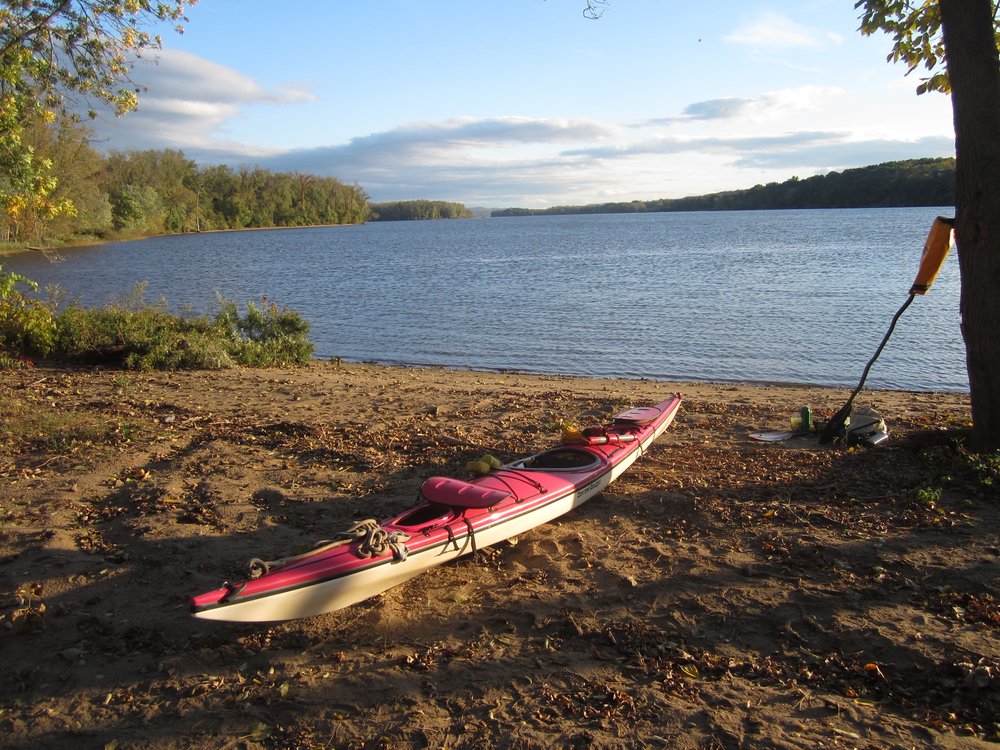
The smooth river pulled me early from my tent, to oatmeal and coffee. Before we slipped into our boats, we stood with our toes in the water and "clapped on" the river. Merle spoke of the beauty and necessity of this river, our time on it. It was but a drop of time, but at that moment I felt like we had been there for days, weeks, my body settled into its aches, my mind into the quiet thoughts that emerged from what I saw. Nothing more.
Then we pushed south, wondering where our adventure would end. As I approached Stockport Middle Grounds, the first flock of Brant coursed by over head. Six more flocks of the small dark geese flapped by, bringing news of the Arctic, and of colder weather, of winter.
I was now in familiar land, reaches I had paddled many times before: Middle Ground Flats, the quirky village of Athens, the Rip Van Winkle bridge. I knew the zig zag path of the channel in this section and how the eastern shore is shallow at low tide.
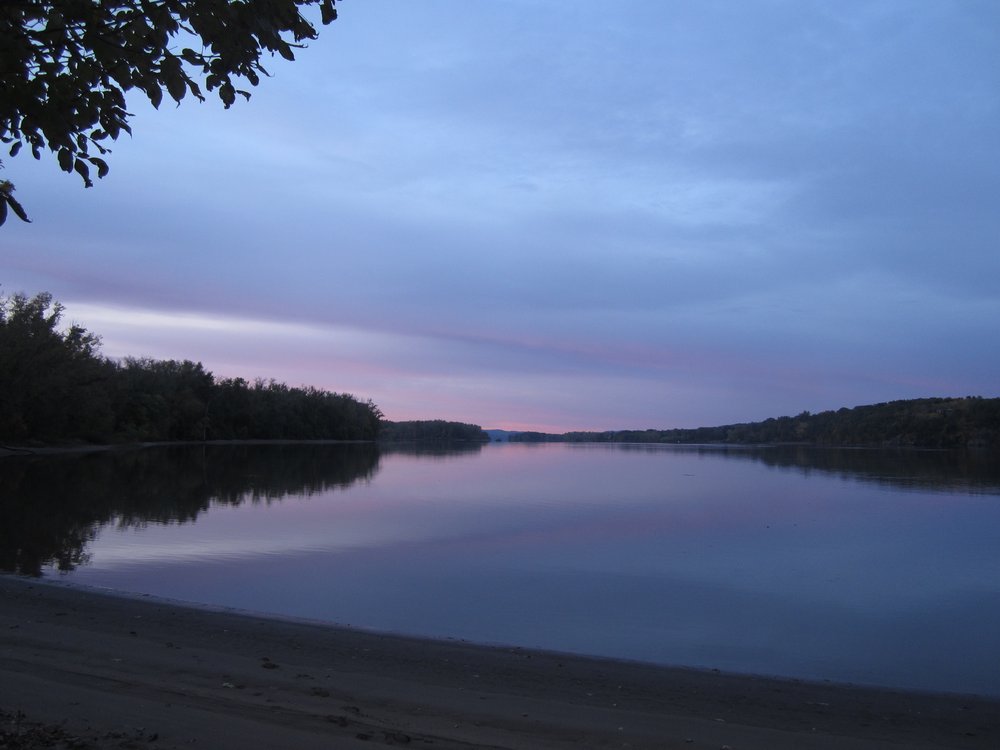
Merle, Kate and I stood with our toes in the water and "clapped off." Merle spoke with a clear wisdom, thanking the river for our time, the company, the adventures had and to come. I had tears in my eyes as we all clapped our goodbye to the river.
The Second Book
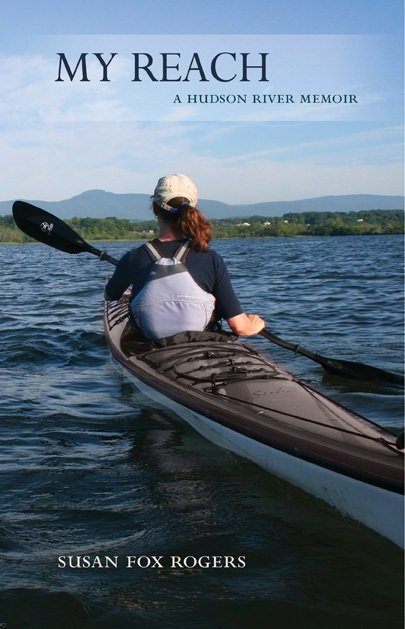 My first book, My Reach: A Hudson River Memoir, appeared one year ago this month. In this year of publication, I have read to kayaking groups, and Hudson River enthusiasts, devoted library goers, and AARP members. I stumbled through an NPR interview and spoke to local papers. It’s been a lot of fun, being in the world, telling the story of writing my book.
My first book, My Reach: A Hudson River Memoir, appeared one year ago this month. In this year of publication, I have read to kayaking groups, and Hudson River enthusiasts, devoted library goers, and AARP members. I stumbled through an NPR interview and spoke to local papers. It’s been a lot of fun, being in the world, telling the story of writing my book.
What I never fail to mention in my talks is that when I set out to write the book, I knew nothing about kayaking and nothing about writing a book. People are in awe that I just plunked my boat in the water and stroked off toward the far shore. But no one says, wow, you sat down in a room by yourself and wrote every single word of a book? That, for me, is the bravest thing I’ve done. I gave up writing this book dozens of times—it was just too hard (the file I kept the manuscript in is labeled: Keep Trying). I say that it took me seven years to write this book, but really, it took me a lifetime. So when I hold my book and read from it, I think, miraculous, with all sincerity.
After I read, someone from the audience inevitably asks: what’s the next book? The next book? The question is a kind one—implied is, “I liked this, I could read more.” Or maybe I am flattering myself—maybe the audience is simply polite. But my response is, “really, I have to do this again?” One book seems plenty, like people who decide that one child is just right. But when you write a book, apparently people think you should write another. In fact, I think I should write another. The problem is, I’m not.
 My first book, My Reach: A Hudson River Memoir, appeared one year ago this month. In this year of publication, I have read to kayaking groups, and Hudson River enthusiasts, devoted library goers, and AARP members. I stumbled through an NPR interview and spoke to local papers. It’s been a lot of fun, being in the world, telling the story of writing my book.
My first book, My Reach: A Hudson River Memoir, appeared one year ago this month. In this year of publication, I have read to kayaking groups, and Hudson River enthusiasts, devoted library goers, and AARP members. I stumbled through an NPR interview and spoke to local papers. It’s been a lot of fun, being in the world, telling the story of writing my book.
What I never fail to mention in my talks is that when I set out to write the book, I knew nothing about kayaking and nothing about writing a book. People are in awe that I just plunked my boat in the water and stroked off toward the far shore. But no one says, wow, you sat down in a room by yourself and wrote every single word of a book? That, for me, is the bravest thing I’ve done. I gave up writing this book dozens of times—it was just too hard (the file I kept the manuscript in is labeled: Keep Trying). I say that it took me seven years to write this book, but really, it took me a lifetime. So when I hold my book and read from it, I think, miraculous, with all sincerity.
After I read, someone from the audience inevitably asks: what’s the next book? The next book? The question is a kind one—implied is, “I liked this, I could read more.” Or maybe I am flattering myself—maybe the audience is simply polite. But my response is, “really, I have to do this again?” One book seems plenty, like people who decide that one child is just right. But when you write a book, apparently people think you should write another. In fact, I think I should write another. The problem is, I’m not.
The second book is a treacherous thing. How many times has a writer put out their first book to good success, only to rush out the second book and have it be mediocre? Especially for those of us who publish later in life (I was 50 when my book came out—a fitting celebration of this landmark year), the first book often is a life-book, the one book. That, no doubt, is my situation. Still, a writer writes and I’ll keep writing. And now that I’ve written a book, another should be waiting in the wings.
I have a lot of friends who seem to be able to do this. As one book comes out, another is nearing completion. Then there are those miracle writers who churn out a book a year. I’d be much more likely to kayak around the globe.
Before I wrote My Reach, what I wrote were sentences that became paragraphs that morphed into pages, then something I called essays. I write essays, I said. I thought that alone an accomplishment. One day, I noticed that all of my essays centered on what I did, which was kayak on the Hudson River. They were filled with adventures and mis-adventures, Bald Eagles and snapping turtles, cement and ice factories. I strung these essays together, gave them shape. It was then that I noticed that the story of my parents lurked at every turn. I brought them into the foreground. I was lucky to find a real editor at Cornell University Press, a man with a pencil who wrote comments in the margins like “cliché!” or “you can do better,” or “we need to hear more about your mother.” I was grateful for it all.
What’s the next book? My editor emails me. Give me a call.
The question makes it sound easy. I thought, after doing it once, it would be not easy, but easier. I’d know the pitfalls, skirt some endless revisions. I’d head into a book with an outline, or at least a plan, rather than feel my way through the dark.
But these past few months, as I’ve sat down day after day to write the next book, I’ve encountered a whole other problem.
I’ve been thinking of writing a book--that’s the problem. When what I write are sentences, paragraphs, essays.
Somewhere in the silence of this summer, I’ve started to write essays again. But it took a lot of silence, sitting on an island in Canada (thanks to cousin Polly!) where I had no internet, no phone. I call it the silence of space, and it’s something I crave and something I know is rare. You can find it in small pockets around the world. It exists in writer’s colonies—I have been lucky to attend two, Ucross and Hedgebrook—where the silence of space greets you at your cabin door. It is both overwhelming and delicious.
The subjects of my summer essays do not neatly line up as they did with my Hudson River kayaking essays. There’s one essay about birding in Alaska, and another about being from State College, Pennsylvania in the wake of the Sandusky affair, and another about dating men after years of dating women, and one about the grandfather I did not know, and the photograph I have of him standing next to Hitler. There’s not a kayak, river, or snapping turtle to be found in these essays.
As I wrote, I loved searching for the next word; I enjoyed watching my ideas unfold. I surprised myself a few times, suffered a bit, and sweated at my desk through the hot summer months. It is possible, but unlikely, that one of these essays will extend and become a book. But after a year of trying to write a book, I now realize that isn’t what matters.
Despite all that I learned while writing a book, I feel like I’m heading out into the dark, holding onto a faith that my literary excursions will take me some place beautiful. It’s hard, holding onto this faith, whether it’s your first essay or your first book. Or your second book. And my guess is, the third book too and on down the line (maybe I’ll get there!). But what matters is sitting down every day and writing those sentences, searching for the next word, and watching my ideas unfold.